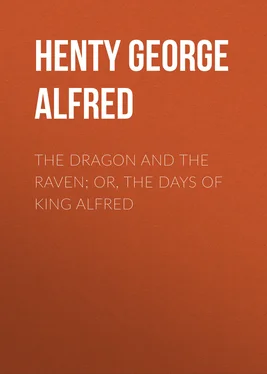George Henty - The Dragon and the Raven; Or, The Days of King Alfred
Здесь есть возможность читать онлайн «George Henty - The Dragon and the Raven; Or, The Days of King Alfred» — ознакомительный отрывок электронной книги совершенно бесплатно, а после прочтения отрывка купить полную версию. В некоторых случаях можно слушать аудио, скачать через торрент в формате fb2 и присутствует краткое содержание. Жанр: Альтернативная история, foreign_antique, foreign_prose, foreign_children, Исторические приключения, на английском языке. Описание произведения, (предисловие) а так же отзывы посетителей доступны на портале библиотеки ЛибКат.
- Название:The Dragon and the Raven; Or, The Days of King Alfred
- Автор:
- Жанр:
- Год:неизвестен
- ISBN:нет данных
- Рейтинг книги:5 / 5. Голосов: 1
-
Избранное:Добавить в избранное
- Отзывы:
-
Ваша оценка:
- 100
- 1
- 2
- 3
- 4
- 5
The Dragon and the Raven; Or, The Days of King Alfred: краткое содержание, описание и аннотация
Предлагаем к чтению аннотацию, описание, краткое содержание или предисловие (зависит от того, что написал сам автор книги «The Dragon and the Raven; Or, The Days of King Alfred»). Если вы не нашли необходимую информацию о книге — напишите в комментариях, мы постараемся отыскать её.
The Dragon and the Raven; Or, The Days of King Alfred — читать онлайн ознакомительный отрывок
Ниже представлен текст книги, разбитый по страницам. Система сохранения места последней прочитанной страницы, позволяет с удобством читать онлайн бесплатно книгу «The Dragon and the Raven; Or, The Days of King Alfred», без необходимости каждый раз заново искать на чём Вы остановились. Поставьте закладку, и сможете в любой момент перейти на страницу, на которой закончили чтение.
Интервал:
Закладка:
The next day came the contingents from several other priories and abbeys, and the sight of the considerable force gathered together gave heart and confidence to all. Algar, Eldred, and the other leaders, Morcar, Osgot, and Harding, moved about among the host, encouraging them with cheering words, warning them to be in no way intimidated by the fierce appearance of the Danes, but to hold steadfast and firm in the ranks, and to yield no foot of ground to the onslaught of the enemy. Many priests had accompanied the contingents from the religious houses, and these added their exhortations to those of the leaders, telling the men that God would assuredly fight on their side against the heathen, and bidding each man remember that defeat meant the destruction of their churches and altars, the overthrow of their whole religion, and the restored worship of the pagan gods.
Edmund went about among the gathering taking great interest in the wild scene, for these marsh men differed much in their appearance from the settled inhabitants of his father's lands. The scenes in the camp were indeed varied in their character. Here and there were harpers with groups of listeners gathered round, as they sung the exploits of their fathers, and animated their hearers to fresh fire and energy by relating legends of the cruelty of the merciless Danes. Other groups there were surrounding the priests, who were appealing to their religious feelings as well as to their patriotism.
Men sat about sharpening their weapons, fixing on more firmly the handles of their shields, adjusting arrows to bowstrings, and preparing in other ways for the coming fight. From some of the fires, round which the marsh men were sitting, came snatches of boisterous song, while here and there, apart from the crowd, priests were hearing confessions, and shriving penitents.
The next morning early, one of the scouts, who had been sent to observe the movements of the Danes, reported that these were issuing from their camp, and advancing into the country.
Algar marshalled his host, each part under its leaders, and moved to meet them. Near Kesteven the armies came in sight of each other, and after advancing until but a short distance apart both halted to marshal their ranks anew. Eldred, with the men of the marshes near Croyland and the contingent from the abbey, had their post in the central division, which was commanded by Algar himself, Edmund took post by his father, and Egbert stood beside him.
Edmund had never before seen the Danes, and he could not but admit that their appearance was enough to shake the stoutest heart. All carried great shields covering them from head to foot. These were composed of wood, bark, or leather painted or embossed, and in the cases of the chiefs plated with gold and silver. So large were these that in naval encounters, if the fear of falling into the enemy's hands forced them to throw themselves into the sea, they could float on their shields; and after death in battle a soldier was carried to his grave on his buckler. As they stood facing the Saxons they locked their shields together so as to form a barrier well-nigh impregnable against the arrows.
All wore helmets, the common men of leather, the leaders of iron or copper, while many in addition wore coats of mail. Each carried a sword, a battle-axe, and a bow and arrows. Some of the swords were short and curled like a scimitar; others were long and straight, and were wielded with both hands. They wore their hair long and hanging down their shoulders, and for the most part shaved their cheeks and chins, but wore their moustaches very long.
They were, for the most, tall, lithe, and sinewy men, but physically in no way superior to the Saxons, from whom they differed very widely in complexion, the Saxons being fair while the Danes were very dark, as much so as modern gypsies; indeed, the Saxon historians speak of them as the black pagans. Upon the other hand many of the Northmen, being Scandinavians, were as fair as the Saxons themselves.
The Danes began the battle, those in front shouting fiercely, and striking their swords on their shields with a clashing noise, while the ranks behind shot a shower of arrows among the Saxons. These at once replied. The combat was not continued long at a distance, for the Danes with a mighty shout rushed upon the Saxons. These stood their ground firmly and a desperate conflict ensued. The Saxon chiefs vied with each other in acts of bravery, and singling out the leaders of the Danes engaged with them in hand-to-hand conflict.
Algar had placed his swordsmen in the front line, those armed with spears in the second; and as the swordsmen battled with the Danes the spearmen, when they saw a shield uplifted to guard the head, thrust under with their weapons and slew many. Edmund, seeing that with his sword he should have but little chance against these fierce soldiers, fell a little behind his father and kinsman, and as these were engaged with the enemy he from time to time, when he saw an opportunity, rushed in and delivered a thrust with his spear at an unguarded point. The Saxon shouts rose louder and louder as the Danes in vain endeavoured to break through their line. The monks fought stoutly, and many a fierce Norseman fell before their blows.
The Danes, who had not expected so firm a resistance, began to hesitate, and Algar giving the word, the Saxons took the offensive, and the line pressed forward step by step. The archers poured their arrows in a storm among the Danish ranks. These fell back before the onslaught. Already three of their kings and many of their principal leaders had fallen, and at last, finding themselves unable to withstand the impetuous onslaught of the Saxons, they turned and fled in confusion towards their camp. The Saxons with exulting shouts pursued them, and great numbers were slaughtered. The Danes had, however, as was their custom, fortified the camp before advancing, and Algar drew off his troops, deeming that it would be better to defer the attack on this position until the following day.
There was high feasting in the Saxon camp that evening, but this was brought to an abrupt conclusion by the arrival of a scout, who reported that a great Danish army marching from the Humber was approaching the camp of the compatriots. The news was but too true. The kings Guthorn, Bergsecg, Oskytal, Halfdene, and Amund, and the Jarls Frene, Hingwar, Hubba, and the two Sidrocs, with all their followers, had marched down from Yorkshire to join the invaders who had just landed.
The news of this immense reinforcement spread consternation among the Angles. In vain their leaders went about among them and exhorted them to courage, promising them another victory as decisive as that they had won that day. Their entreaties were in vain, for when the morning dawned it was found that three-fourths of their number had left the camp during the night, and had made off to the marshes and fastnesses.
A council of the chiefs was held. The chances of conflict appeared hopeless, so vastly were they out-numbered by the Danes. Algar, however, declared that he would die rather than retreat.
"If we fly now," he said, "all East Anglia will fall into the hands of the heathen. Even should we fight and fall, the example of what a handful of brave men can do against the invaders will surely animate the Angles to further resistance; while if we conquer, so great a blow will be dealt to the renown of these Danes that all England will rise against them."
On hearing these words all the chiefs came to the determination to win or die as they stood. Eldred took Edmund aside after this determination had been arrived at.
"My son," he said, "I allowed you yesterday to stand by my side in battle, and well and worthily did you bear yourself, but to-day you must withdraw. The fight is well-nigh hopeless, and I believe that all who take part in it are doomed to perish. I would not that my house should altogether disappear, and shall die more cheerfully in the hope that some day you will avenge me upon these heathen. Therefore, Edmund, I bid you take station at a distance behind the battle, so that when you see the day goes against us you may escape in time. I shall urge our faithful Egbert to endeavour, when he sees that all is lost, to make his way from the fight and rejoin you, and to journey with you to Wessex and there present you to the king. For myself, if the battle is lost I shall die rather than fly. Such is the resolution of Algar and our other brave chiefs, and Eldred the ealdorman must not be the only one of the leaders to run from the fray."
Читать дальшеИнтервал:
Закладка:
Похожие книги на «The Dragon and the Raven; Or, The Days of King Alfred»
Представляем Вашему вниманию похожие книги на «The Dragon and the Raven; Or, The Days of King Alfred» списком для выбора. Мы отобрали схожую по названию и смыслу литературу в надежде предоставить читателям больше вариантов отыскать новые, интересные, ещё непрочитанные произведения.
Обсуждение, отзывы о книге «The Dragon and the Raven; Or, The Days of King Alfred» и просто собственные мнения читателей. Оставьте ваши комментарии, напишите, что Вы думаете о произведении, его смысле или главных героях. Укажите что конкретно понравилось, а что нет, и почему Вы так считаете.












